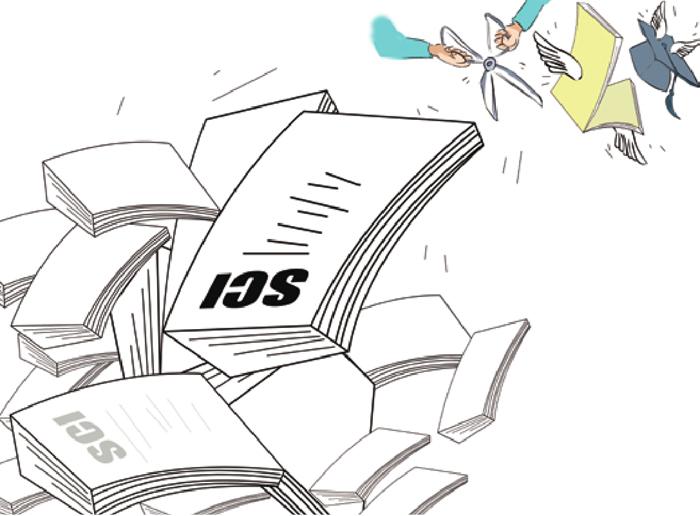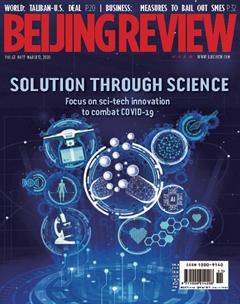Should SCI Theses Criterion Be Revoked?

Recently, a notice released on the website of Chinas Ministry of Education(MOE) stirred a controversy in the countrys universities. The notice listed 10 suggestions targeting Science Citation Index (SCI) academic papers. It stated that the publication of theses in SCI journals should not be directly linked to the professional evaluation or recruitment of teaching staff; universities should refrain from using SCI theses and relevant impact factors as a restrictive condition for students graduation and academic degrees; and SCI theses should not be referenced while giving rewards or prizes to individuals or departments.
SCI is a list of scientific texts from around the world, created by the Institute for Scientifi c Information in the U.S. in the early 1960s. It covers life science, physics, chemistry, medical science and others, and is used to evaluate the academic level of the science world. SCI is globally recognized as an authoritative academic evaluation system and SCI theses refer to papers that are published in journals cited by SCI.
In the late 1980s, Nanjing University introduced SCI in China, and it was picked up by many Chinese universities as it was seen as an objective criterion for scientific research performance evaluation. Initially, the SCI evaluation system was adopted to avoid interference in academic evaluation by means of guanxi, or personal social connections. However, as SCI was increasingly seen as the only evaluation criterion and the SCIcentered evaluation system swept across the academic community, some negative impacts emerged.
Some people believe that SCI is an excellent evaluation system that keeps China on par with international scientifi c research levels. However, others believe that the overemphasis on this system seems to do more harm than good.
Every year, China produces a huge number of SCI theses, but the quality of some papers is questionable. Compared to the developed world, China still lags behind in terms of citations and many Chinese SCI theses are retracted every year. Thus, Chinese scholars are wasting a lot of time and energy on unnecessary work while curbing their creativity. While some people read MOEs suggestions as a prelude for the removal of the SCI thesis evaluation system altogether, others believe that it points to doing away with the worshipping of SCI, instead of scrapping it altogether.
A balancing act
Zhang Duanhong (The Beijing News): To some extent, SCI worshipping is damaging the fundamentals of academic research and stunting academic innovation. Still a great number of scholars align themselves with SCI standards and dont want to see it uprooted.
When publication in SCI journals is adopted as a criterion for academic evaluation, individuals at least have a channel to reach their goals, so if this is removed, what will replace it?
Most scholars lack confi dence in Chinas imperfect peer evaluation system. If SCI criterion gives way to peer review, we are almost certain to see many individuals seeking favor from peers through various means, including bribery. This is the major reason for concern among many scholars. SCI worshipping is unacceptable, but there must be a criterion. If there is a new one, it must be a strict yardstick and not department votes from a university or a science institute or evaluation by peer experts from other provinces. We can expect unfairness in this system even before its put into use.
The MOEs document aims to curb the worshipping of SCI and correct abused indexes, but not to cancel the SCI criterion altogether.
Relaxing control over academic evaluation will help to diversify scholars academic activities and in such a free environment, their creativity can be brought out more.
If a scholar is interested in experimental science, its possible for him or her to publish many papers in SCI journals. In this case, SCI is generally a good criterion for academic evaluation. However, in some other cases, scholars are not engaged in scientifi c experiments, but are good at writing books, thus the publication of books should also be used as a criterion. Similarly, some scholars can provide excellent suggestions based on their research, which in turn translate into helpful government policies. Their work should also be recognized even if they have no published SCI theses.
Zhao Enuo (Peoples Daily): The dominant position of SCI has long been condemned by the Chinese scientifi c academic community. Since SCI theses are used as a disproportionately major index to evaluate individuals academic performance, which in turn decides professional titles, promotions, relevant resource distribution and university rankings, some scientifi c research institutes and universities spend too much time and energy on cranking out these papers, neglecting what they are really supposed to be doing.
To strengthen Chinas education and advance its science and technology development, we need to create an academic environment that is friendly to science and education staff who are really good at what they do and encourage them to make more contributions in their respective areas so as to improve Chinas overall scientifi c research and academic system.

